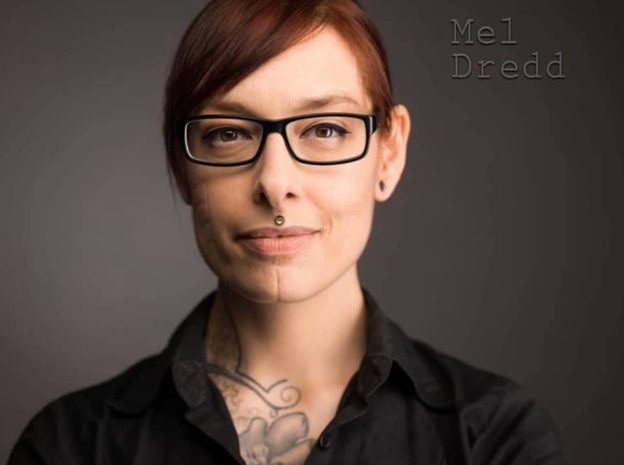„Die Idee hinter diesem Thema ist, die Herangehensweise an das Tätowieren aus einem weniger technischen als mehr aus einem ethischen Blickwinkel zu betrachten.
Wenn wir all die neuen Vorschriften beobachten, die für den Tätowiererberuf gelten, stellen wir einen Trend fest. Es wird mehr und mehr zu ein paramedizinischer Beruf gewandelt, als das, was es eigentlich ist.
Und als Tätowierer und Mediziner, die wir in diesem Bereich tätig sind, müssen wir unser Verhalten, die Behandlung und Nachsorge unserer Kunden entsprechend anpassen.
Wie es das Credo der Ärzteschaft verspricht, sollten wir keinen Schaden anrichten, auch nicht um den Preis eines kleinen Schmerzes.“
Dies sind die einleitenden Worte von Mel Dredd’s Abstract, den die junge Tätowiererin aus Kopenhagen (Dänemark) anlässlich des 5. World Congress on Tattoo and Pigment Research Ende August 2021 vorstellte.

Hi everyone, my name is Mel and I am a tattooist currently working in Copenhagen. I want to thank professor Serup for giving me the opportunity to present this essay.
Facebook: https://www.facebook.com/shadowkult 24. August 2021
I’ve been tattooing for a decade, tattooed for three, and I’ve seen both sides of the profession, as a tattooist and as a client.
We’ve seen major changes in our field, especially in the last ten years, particularly in terms of the technology behind the products we use, like inks and aftercare, but also how we, tattooists, approach the activity of tattooing itself.
We finally have the recognition that our industry is not just a passing fancy for wannabe tough crowds and systemic rebels, but an art form unto itself.
Our knowledge of skin health and its impact on our clients’ health also has grown, but it seems that some elements have been left behind, as more of our day to day work has been pushed towards a more clinical approach.
I see the change towards a more paramedical and allied health profession as a good thing, myself, but I know a lot of tattooists disagree, citing this push as a form of smothering of our artistic freedom.
The new regulations are, in my opinion, a great way to better our profession and not a hindrance to our artistic freedom.
However they do require a much more strict approach to our work than in the past, and also require a great deal more knowledge in terms of health care in general and skin health in particular.
I can see how it can be difficult to adjust to those new rules, but I believe it is a boon for us, not a restrictive carcan.
Here are my views:
In terms of the inks tracing and registering of clients, I know it takes a great deal more time and effort from us, and yes it is occasionally annoying, but we need to keep in mind that with all the counterfeit products found on the market nowadays, we have no other solution than to do our part of the job to keep the public safe.
We can’t afford to have untraced contaminated or unsafe products out there and do nothing to prevent potential harm.
Ethically and economically it makes no sense for us to even take the risk of having any negative outcome, even if the risks are very low.
So our best bet is to figure out a more streamlined and easier way to do these registrations and cross reference our findings.
In terms of health education and medical knowledge, we must do better than what we do now. I’ve heard many colleagues in different countries complain about the obligatory health certificates required for tattooing, and I am absolutely convinced that these are, in fact, not enough.
A day of cross contamination and bloodborne pathogens education is not sufficient, in my opinion, to guarantee our good faith towards our clients. We deal with open wounds, bodily fluids, and other contaminants on a daily basis, and if we do not know what we’re talking about, we can’t guarantee that we know what we’re doing.
As we’ve seen with the current pandemic, it only takes one idiot to ruin everyone’s hard work.
I would recommend that hygiene courses actually contain more practical examples of real life images collated by dermatologists and tattooists alike, with literal study cases to impress upon everyone in our profession that this is actually very serious business.
We also must study what can go wrong with a tattoo so we can better orient our clients in the event of adverse reactions, and for that we need to defer to dermatologists, and we need to learn.
How many of us tattooists know the difference between a plaque elevation allergic reaction and a hypercheloid reaction?
How many of us know what sarcoidosis, one of the most prevalent adverse reaction, is? That’s simply not good enough: if we want to tattoo, we must understand the consequences of what we are doing. Otherwise, we’re all frauds.
But we must also do away with irrelevant criteria in terms of safety concerns in studios, for example, that actually distract us from the heart of the issue, which is safety.
Of course carpet in a tattoo studio is an absolute no go, but having frames on the wall two meters away from the tattooing area is not an issue to our clients’ health. Health inspectors are not properly trained for inspections in tattoo studios and that causes clashes and incomprehensible situations.
All of us should have the same sensible, non hysterical regulations, that take into account that we are not just performing paramedical acts but also art, rituals even, on real humans with real life consequences.
This business of taking away studio individuality and making everything extremely clinical rubs a lot of us the wrong way, myself included.
Another ethical issue that I found a lot of my colleagues are struggling occasionally with is the client vs customer issue. We are not medical professionals, we do not treat patients, but neither are we just product salespeople.
We work on the human body and we do create, once again, open wounds. We don’t just draw tough stickers on people and send them away without a care. We don’t just sell designs, we mark people for life through extensive trauma to the skin.
I do have a responsibility to give clients the best experience, not only in terms of safety, hygiene and practice, but also in terms of prep and follow up. Therefore I would like to impress on people that we must do away with some of the old ways of treating our clients.
They’re humans. We are the professionals. They are not always right ( almost never, actually) but pressuring them, belittling them, rushing them and not particularly caring about them is, with bad technique, the worst things against us in this industry.
I would propose, in the hygiene courses, that a quick rundown on bedside manners, inspired by some of the medical carers, should be touched upon.
I am tired of seeing 18 year old kids coming to me for a cover up after yet again some gruff tattooist decided to pressure them into getting something they didn’t really want just because they were scared of saying no, or were fully ignored and the tattooist decided to do what they wanted to do.
This damages our reputation as much as an infected tattoo. We should be respectful and trustworthy. Not bullies.
In short, I think our profession is getting better, but we still have a long way to go to be excellent. We need to rethink our range of skills, knowledge and behaviour.
We can, and will, do better, but we must do it together, with doctors, with clients, and by pushing aside some of our outdated ways of thinking about tattooing. We must be responsible.
As Hippocrates said:
“Make a habit of two things, to help; or at least, to do no harm.”

